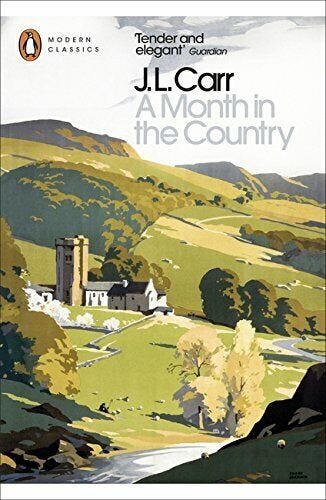Book Review III: A Month in the Country, by J.L. Carr
Someday, after a sale, a stranger will find it there and wonder why
I can’t begin to tell you how much I loved this book. This short, almost perfect book.
It hit my radar while reading Checkout 19 — a novel which mentions, in one chapter, probably 100 different books and authors — and I bought it and read it in just three days.
On its surface, it’s the story of a World War 1 veteran who travels to a small town in the north of England to help restore a mural on the wall of a church. Along the way he reflects on the war, and his lost marriage; and he meets and befriends local townspeople. That’s it, that’s the whole book. But, somehow, it’s perfect. Wistful without being sentimental; evocative without being wordy. It is a simple story, well told, and that’s it.
Oddly, it reminded me of Ishiguro’s Never Let Me Go in its almost overwhelming sense of melancholy without ever hitting you over the head with it. There is loss hanging in every word Carr writes, and yet the novel is full of joy, and healing. The loss came before. And will come again later. But here, now, things are fine. It is essentially three stories in one. Told all at the same time. Until you aren’t quite sure which is which … such is life. We look forward at the past. The future behind us. The present just shifting sand.
When I finished the book, it felt like someone had sucked all the air out of the room. I felt lost and shaky. In the best way possible. Haunted. I felt haunted. I wanted to crawl back into the book and live there forever. That one perfect summer in a small village in northern England. And all those kind characters, all those flawed humans, all those summer days before autumn and winter stripped it all away. Cozy, doleful, pleasant. A room in a belfry and a job to do and a friend down the way.
Two of my favorite movie endings in all of film are from The Grand Budapest Hotel and Local Hero. Both movies are about loss, and coming to terms with loss, and finding healing in far off places, and then having to leave. When I finished A Month in the Country, I thought of the phone ringing in the phone booth in that little town in Scotland in Local Hero. And I thought of the author on his couch at the end of the Grand Budapest:
“It was an enchanting old ruin, but I never managed to see it again.”
A Month in the Country is a monumentally sad book. But it’s also funny, and charming, and full of empathy for its characters. In fact, it’s mostly those things, and then it’s over, and, like the narrator, we are left only with our memories, with no idea what will come next. Until it’s too late.
What a gosh darn perfect book.
*
Next up: A Bend in the River by V.S. Naipaul.



